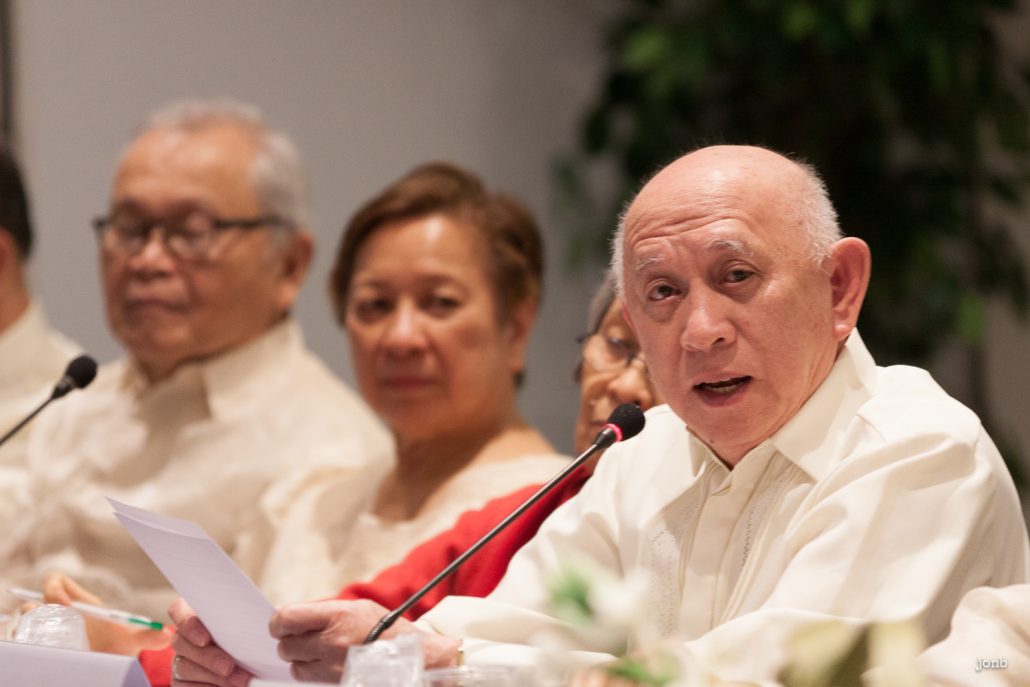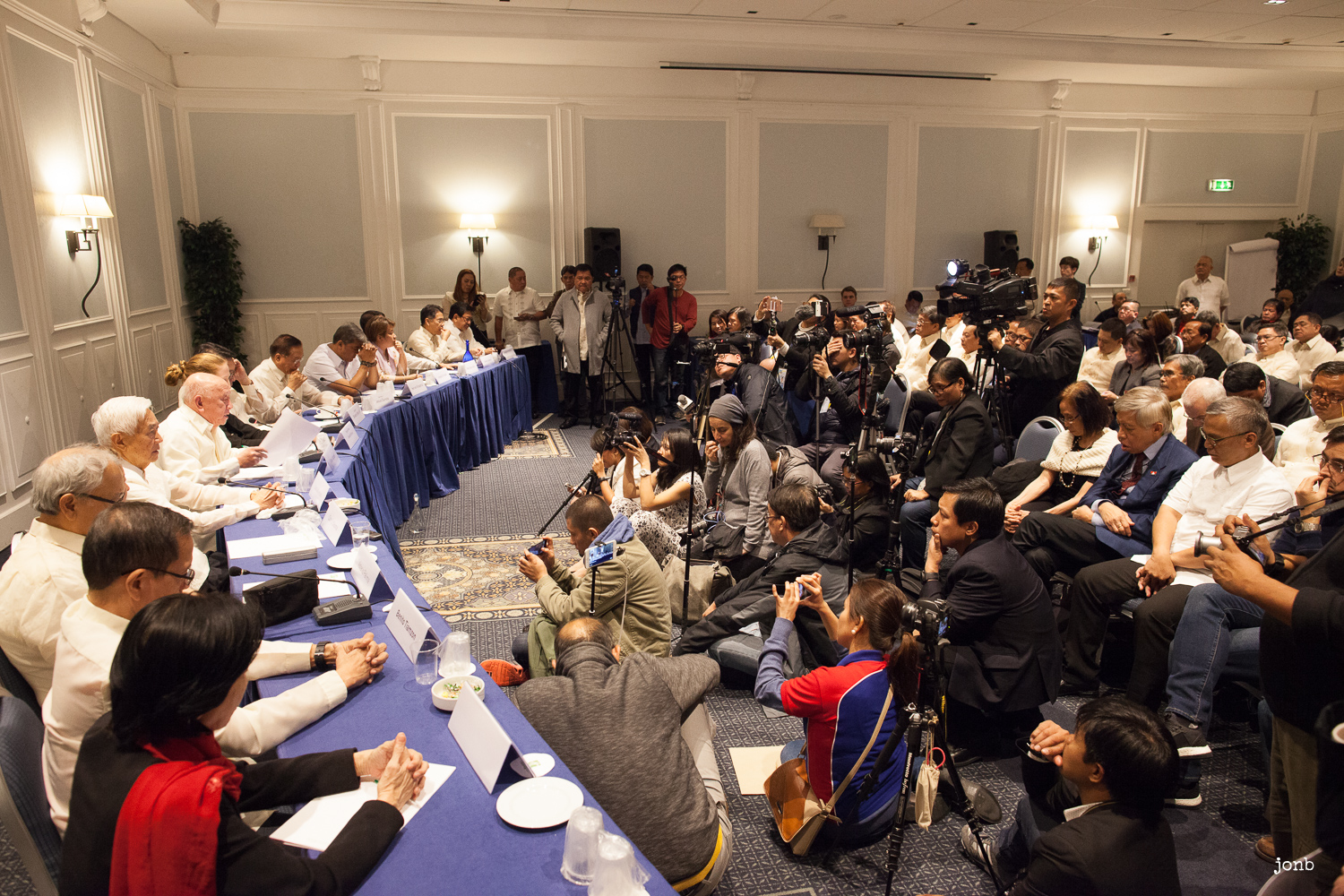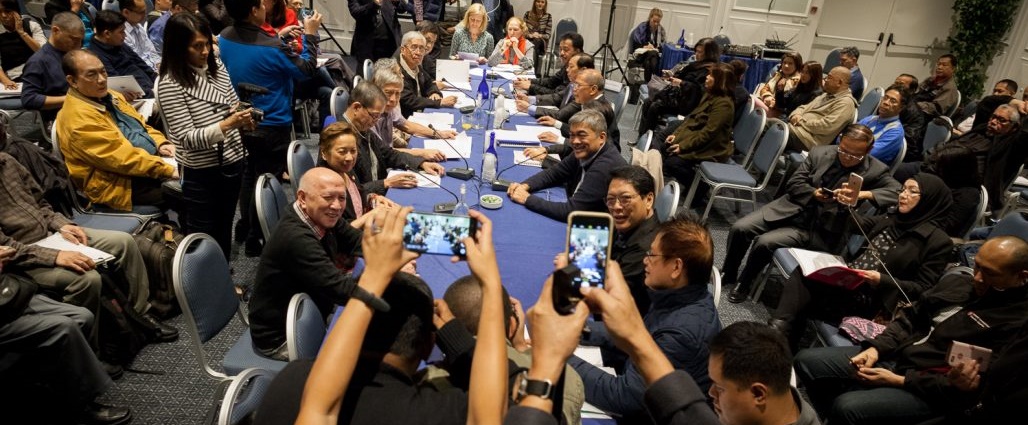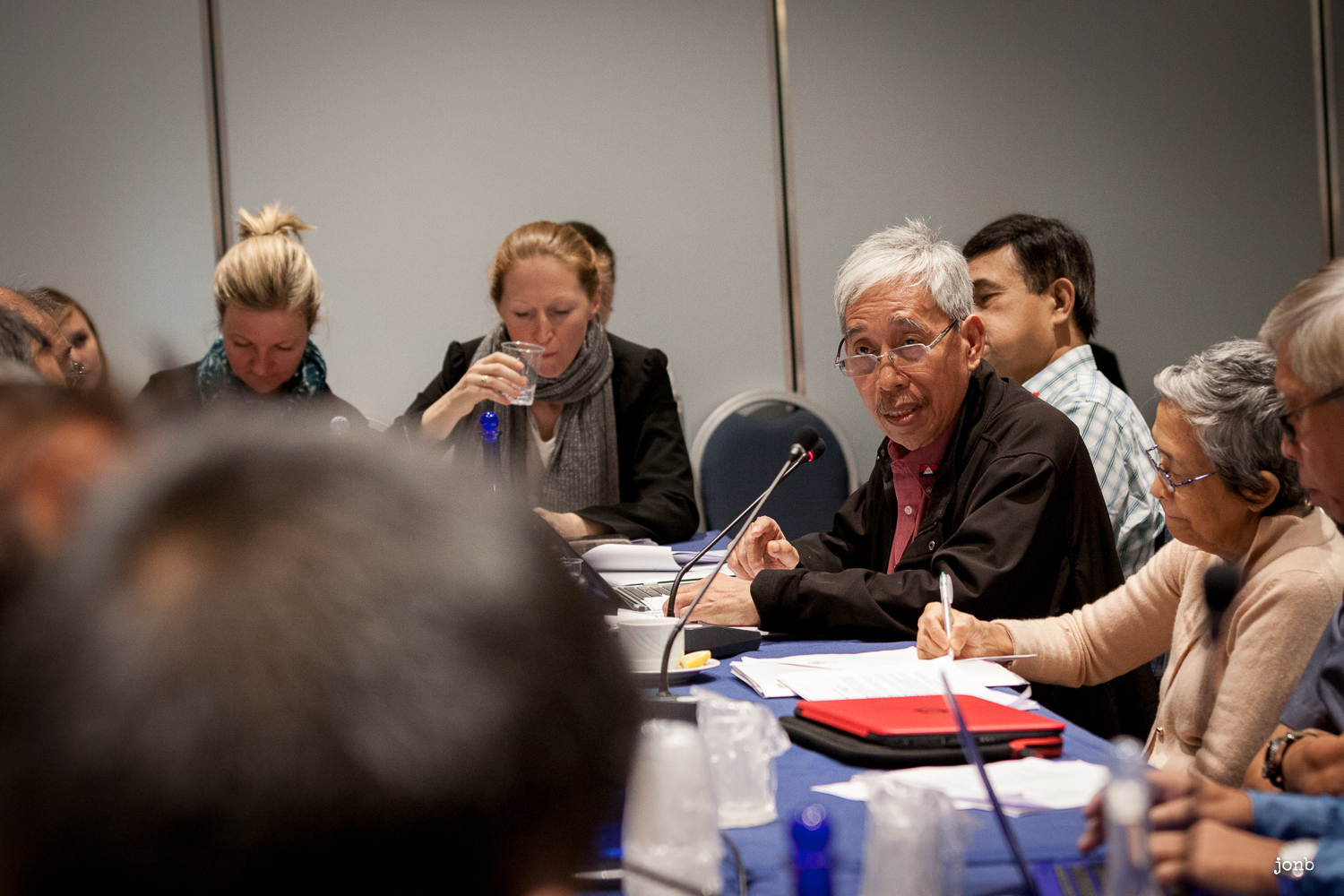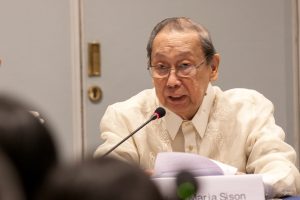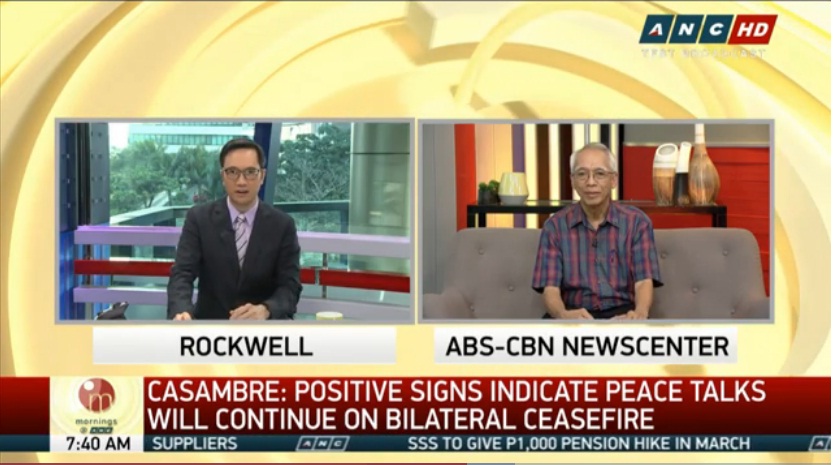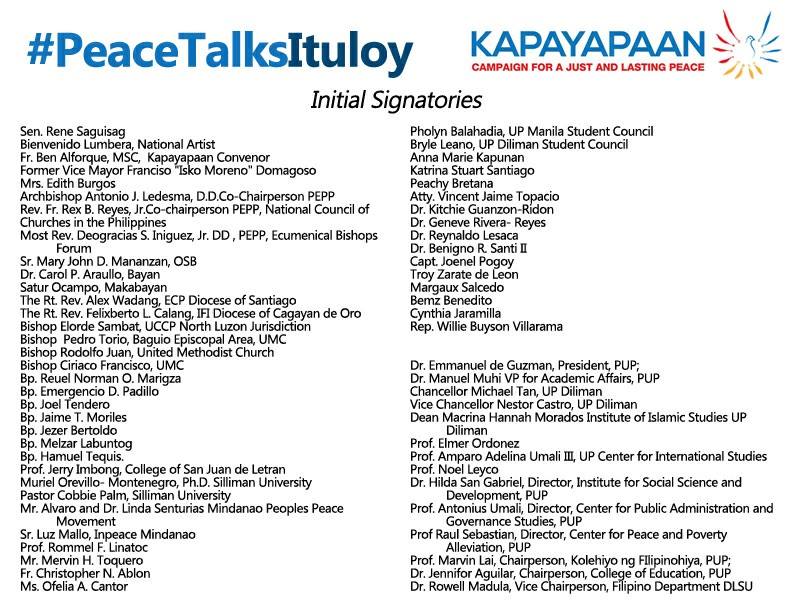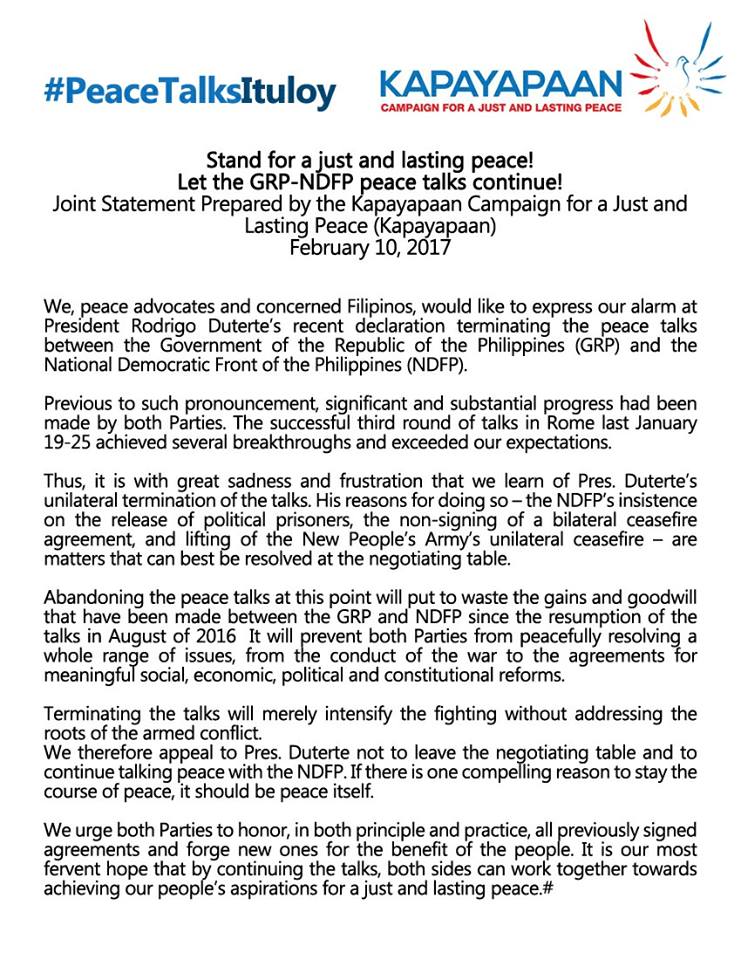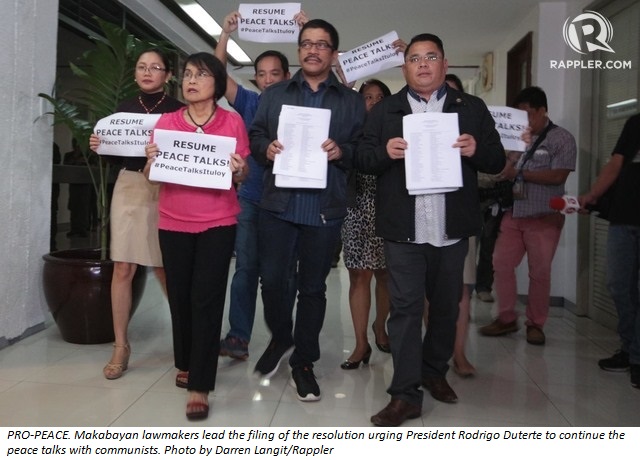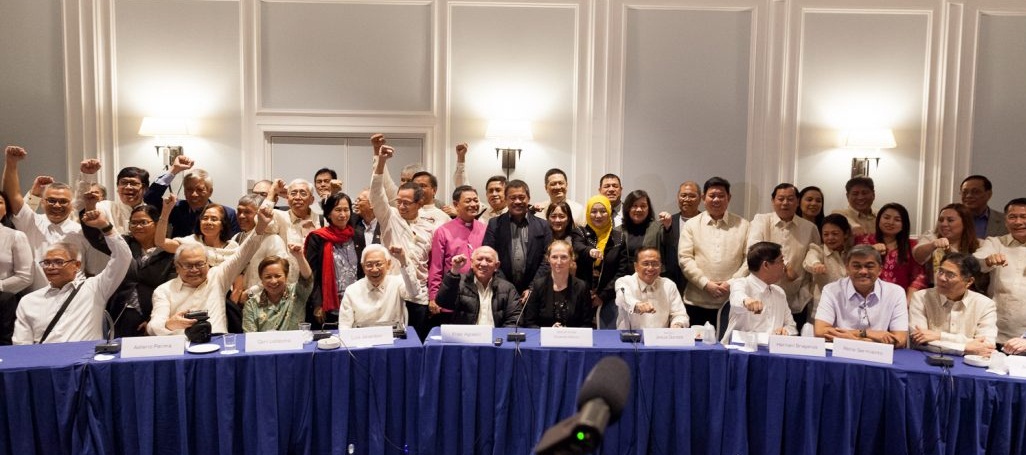
NDFP International Information Office
25 January 2017/in News /
The Negotiating Panels of the Government of the Republic of the Philippines (GRP) and the National Democratic Front of the Philippines (NDFP), together with their respective delegations of negotiating bodies, consultants, advisors, resource persons, cooperators and staff successfully held the third round of formal talks in Rome City from January 19 to 25, 2017. The third round was facilitated by the Royal Norwegian Government (RNG) in cooperation with the Italian Government.
At the opening ceremonies on January 19, RNG Ambassador to the Philippines Erik Førner and RNG Special Envoy to the Philippine Peace Process Elisabeth Slåttum welcomed the two delegations. They commended the two Parties for their hard work in the second round of the formal talks in Oslo and reiterated the commitment of the RNG of its continuing support to the GRP-NDFP peace negotiations.
The opening statements of the two Parties were made by the following: GRP OPAPP Secretary Jesus G. Dureza, NDFP Chief Political Consultant Jose Maria Sison, GRP Negotiating Panel Chairperson Silvestre H. Bello III, NDFP Negotiating Panel Chairperson Fidel V. Agcaoili and RNG Special Envoy Ambassador Elisabeth Slåttum.
In her opening statement, RNG Special Envoy to the Philippine Peace Process, Ambassador Elisabeth Slattum, congratulated both Panels for their commitment in working for peace in the country. She commended the two sides for declaring their respective unilateral indefinite ceasefires. The Ambassador reiterated the RNG’s commitment to be with the two Parties for the duration of the peace negotiations.
The Presidential Adviser on the Peace Process, Secretary Jesus G. Dureza after thanking the RNG passed on part of his speaking turn to GRP Foreign Secretary Perfecto Yasay, Jr., who expressed his support to the peace process. Sec. Yasay also expressed his admiration for Professor Joma Sison and his elation for having met with him personally.
In his opening statement, Professor Sison expressed his continued declaration that the two Panels can negotiate in a non-adversarial way and overcome any obstacle by addressing the root causes of the armed conflict. He also acknowledged his appreciation for last year’s release of detained NDFP consultants and the expectation for the release of the hundreds of political prisoners. Further, he cited that the concurrent or reciprocal unilateral declarations of ceasefire by the GRP and NDFP can easily be turned into a more stable bilateral ceasefire upon the release of all political prisoners by the GRP in compliance with the CARHRIHL. He likewise expressed NDFP’s concerns on the burial of former President Marcos in the Libingan ng mga Bayani and violation of the CARHRIHL and the ceasefire.
Professor Sison was hopeful that within six months the CASER shall already be ready for signing, while the NDFP views political and constitutional reforms can take good and viable examples from both unitary and federal forms of state. He said that the NDFP can go along with President Duterte’s proposal for a federal form of government provided certain safeguards were put in place like the prohibition of puppetry, dictatorship, graft and corruption, dynasty building and warlordism.
He pointed out the advantage of having the CASER and CAPCR signed and approved by the principals within the first two years of the Duterte Government is that these agreements shall be implemented for at least two years before the end of said government. If implemented to the satisfaction of the Filipino people and the NDFP, these agreements shall lay the full basis of the Comprehensive Agreement on End of Hostilities and Disposition of Forces as early as 2020-2021.
On the part of the GRP Panel Chairperson, Secretary Silvestre H. Bello III, he expressed the readiness of the Panel to exchange and discuss the Government’s draft agreements on CASER, CAPCR and CAEHDF, through its Working Committee/Groups, and finalize the Supplemental Guidelines for the full operation of the Joint Monitoring Committee of the CARHRIHL as well as the draft agreement on the bilateral ceasefire. Secretary Bello also expressed the readiness of the Panel to discuss and address the issues confronting the talks such as prisoner release, implementation of the reconstructed JASIG list and the amnesty proclamation. He capped his statement by thanking the support of the RNG Third Party Facilitator, and expressed his expectation for a cordial but frank, rigorous but productive discussions.
The NDFP Panel Chairperson, Fidel V. Agcaoili, declared the NDFP Panel’s readiness to push the negotiations forward and even accelerate the process of forging mutually acceptable comprehensive agreements on the most important topics of socio-economic reforms and political and constitutional reforms. He noted however, certain serious obstacles that are needed to be hurdled if mutual trust and confidence are to be maintained so that negotiations can move forward. He repeatedly raised the issue of the release of all the NDFP-listed prisoners, and expressed appreciation for the support of the RNG to the peace talks.
Before going into the first item on the agenda of the third round of formal talks, a delegation from both Parties met to discuss certain outstanding issues and concrete measures to facilitate the peace negotiations. They discussed the issues of release of political prisoners and of socio-economic projects in relation to the Joint Agreement in Support of Socioeconomic Projects of Private Development Organizations and Institutes of March 16, 1998. The Parties discussed the signing of CASER with issues of the amnesty of political prisoners and the signing of a bilateral ceasefire agreement.
On Implementation of CARHRIHL and JASIG
The two Parties agreed to strictly comply with the Comprehensive Agreement on Respect for Human Rights and International Humanitarian Law (CARHRIHL), the first major agreement signed by the Parties in accordance with the 4-item substantive agenda as provided for in The Hague Joint Declaration.
In this connection, the Joint Monitoring Committee discussed and finalized the Supplemental Guidelines for the Joint Monitoring Committee (JMC). (Annex A) The Guidelines were subsequently signed by the respective Panel Chairpersons, Monitoring Committees, Supervising Panel Members and witnessed by the Third Party Facilitator. These Supplementary Guidelines will guide and fully operationalize the work of the Joint Monitoring Committee (JMC) in its task of monitoring the implementation of, and achieving, the objectives of CARHRIHL in upholding and promoting human rights and international humanitarian law.
These Guidelines supplement the Operational Guidelines for the JMC of 14 February 2004 and the Partial Supplemental Guidelines for the JMC of 24 June 2004 governing the monitoring mechanism of the implementation of the CARHRIHL.
In the first working session of the two negotiating panels, the NDFP raised the following issues regarding the GRP’s implementation of the CARHRIHL and JASIG:
The NDFP panel cited with concern the urgency for the GRP to repeal the remaining repressive Marcos decrees that continue to be used against political prisoners and the people; non-observance of the Hernandez political offense doctrine prohibiting the criminalization of acts in pursuit of one’s political beliefs; the perceived political rehabilitation of Marcos and its implications to the rendering of justice for the Martial Law victims; the incidents of occupying schools, barangay halls, and other civilian structures in the rural communities as part of GRP’s Oplan Bayanihan; and the due process issues in relation to the GRP’s anti-drug campaign.
The NDFP panel also cited the continuing detention of three NDFP consultants promised presidential pardon and the surveillance and harassment of NDFP consultants participating in the ongoing peace talks.
The NDFP panel conveyed that violations of the GRP unilateral ceasefire covering more than 500 barangays were increasingly endangering the peace talks.
The NDFP panel requested for a copy of the official document on Oplan Kapayapaan that replaces the Oplan Bayanihan of the Aquino administration. The GRP Panel clarified that Oplan Kapayapaan is not operational yet, having been submitted to the authorities concerned but not yet approved.
The NDFP Panel Chairperson previously submitted on November 28, 2016 and January 4, 2017 to the GRP documented complaints of ceasefire violations.
The GRP panel responded by giving its assurance that the GRP acknowledges having signed the CARHRIHL and its commitment to comply with its obligations under the said Agreement. If there are any reported violations of the Agreement on the part of the GRP, these should all be put into writing and submitted to the GRP Panel, which will then study these reports and take the appropriate action. The panel stated that there is no conscious policy on the part of GRP to violate the CARHRIHL and JASIG.
The GRP panel assured the NDFP that the aforementioned three NDFP consultants will be released. With regard to the surveillance and harassment of NDFP consultants, the AFP-Peace and Development Office (AFP-PDO) replied that the AFP recognizes the safety and immunity guarantees of the NDFP consultants. With regard to the reported occupation of schools, hospitals and communities, the AFP-PDO replied that AFP troops went into the communities upon the invitation of local government units, escorting civilian agencies delivering services to the communities.
The GRP Panel explained that the internment of the Marcos remains at the Libingan ng mga Bayani was not intended to politically rehabilitate him. With regard to the indemnification of Marcos human rights victims, the GRP pointed out that the President has taken a direct hand at speeding up the processing and ensuring that a significant number would immediately be given their indemnification.
On the other hand, the GRP Panel Chairperson handed to the NDFP Panel Chairperson a copy of the GRP documented complaints on ceasefire violations committed by the NDFP.
On Amnesty and Releases
The NDFP Panel followed-up the status of the amnesty proclamation of all political prisoners (as listed by the NDFP) and reiterated that it is the most expeditious way of releasing them.
The Parties agreed to continue to study the issuance of an amnesty proclamation consequent to the substantial progress of the peace negotiations.
The GRP Panel also committed to facilitate the release of the three remaining NDFP consultants, Eduardo Sarmiento, Emeterio Antalan and Leopoldo Caloza, through presidential clemency, and other legal modes.
The GRP, with the assistance of the defense lawyers, shall expeditiously process the release of all the political prisoners listed by the NDFP starting with the 200 qualified prisoners either through bail, recognizance, pardon or other legal processes in compliance with the CARHRIHL and to allow them to participate in activities and mechanisms of the peace process.
The GRP team committed to file immediately the necessary manifestations in support of the motions for the temporary liberty of the NDFP consultants and staff granted bail and released in August 2016 be extended and remain effective for the duration of the peace negotiations.
Results of the Proceedings of the RWCs-SER
The GRP and NDFP Reciprocal Working Committees on Social and Economic Reforms (RWCs-SER) met on January 20 to 21, and 23 to 24, 2017, together with their respective consultants and resource persons.
The RWCs-SER had exchanged their complete drafts of the CASER more or less ten days before the opening of the third round of formal talks.
The RWCs-SER reaffirmed their April 2004 agreement on the Preamble and the Declaration of Principles (Part I) as the framework of the CASER, provided that the unresolved provisions, including new insertions of the NDFP, will be elevated to the negotiating panels for their resolution.
Discussions on the Bases, Scope and Applicability (Part II) were substantially made and points of agreement were identified. The reaffirmation of Part III entitled Desired Outcomes, which was approved during the second round of talks, was made.
The RWCs-SER also started discussions on Agrarian Reform and Rural Development (Part IV). They reached a common understanding on the general features of the agrarian problems in the Philippines.
The RWCs-SER agreed in principle to the free distribution of land to farmers and farm workers as part of the governing frameworks of CASER.
For the purpose of accelerating the negotiation process of the CASER, the RWCs-SER agreed to the creation of bilateral teams to help reconcile contentious provisions in the GRP and NDFP drafts and/or provisions which have no corresponding equivalent in each RWCs’ exchanged drafts. The bilateral teams shall submit to their respective RWCs the necessary recommendations.
The bilateral teams may hold meetings in Metro Manila, Philippines, or in any mutually agreed upon venue in the Philippines, or in any neighboring country.
The Panels and RWCs-SER signed on 25 January 2017 the Ground Rules for the Conduct of the Formal Meetings between the RWCs-SER of the GRP and the NDFP. (Annex B)
In the next round of formal talks, the RWCs-SER shall discuss the remaining items under the Agrarian Reform and Rural Development (Part IV), National Industrialization and Economic Development (Part V), Environmental Protection, Rehabilitation and Compensation (Part VI), and the outputs of the bilateral teams.
Results of the Proceedings of the RWGs-PCR
The Reciprocal Working Groups (RWGs) on Political and Constitutional Reforms (PCR) met twice and formally exchanged full drafts of the tentative Agreement on PCR based on the common outline agreed upon during the last round of talks in October 2016. This surpassed the earlier expectation that the RWGs would only enflesh the said outline in the third round.
The RWGs assisted by their consultants, staff and observers, ran through their respective drafts highlighting their main points, proposed mechanisms and framework.
They exchanged initial and general views, opinions and comments as well as questions on certain provisions of their drafts.
They exchanged views on the proposal for a federal form of government and the need for certain constitutional guarantees and safeguards demanded by the people.
Thereafter, they exchanged and presented their respective comparative matrices of the drafts.
They also agreed to hold unilateral meetings of the RWGs to rewrite their respective drafts and matrices taking into account the drafts that they have exchanged.
The RWGs acknowledged that the tentative drafts shall be subject to the developments in the crafting of the CASER.
They agreed to meet again during the fourth round of formal talks and work on a common matrix as a reference for discussions.
Meeting of the Ceasefire Committees
The NDFP ceasefire committee (CFC) formally acknowledged receiving the GRP CFC draft “Agreement on an Interim Bilateral Cessation of Hostilities Between the GRP and the NDFP”. It said that it will seriously study the proposal, submit comments and may provide its own updated version of its proposed draft agreement for an interim bilateral ceasefire.
NDFP Panel Chairperson Fidel V. Agcaoili handed a letter addressed to GRP Panel Chairperson Silvestre H. Bello III formally protesting the AFP military operation in Makilala, North Cotabato as a violation of the ongoing ceasefire.
The Parties note that their unilateral indefinite ceasefires remain in place. They note however that there are issues and concerns related thereto.
The two CFCs agreed to meet again during the period on February 22-27, 2017 in The Netherlands simultaneous to the opening of the bank safety deposit box account for safekeeping of the JASIG documents of identification.
Fourth Round of Formal Talks
The Parties agreed to meet for the fourth round of formal talks in Oslo, Norway on April 2-6, 2017. They shall continue to work on strengthening the mechanisms in the implementation of CARHRIHL and the unification of the drafts of CASER and CAPCR.
Expression of Gratitude to RNG
Both Panels reiterated their appreciation and gratitude to the Royal Norwegian Government (RNG) for its unrelenting support to and active facilitation of the peace talks which have allowed both sides to move these forward. They also thanked the RNG for the two international experts that they provided who shared their insights on peace negotiations that the Parties may find useful.
Once more they expressed their gratitude to the RNG for its consistent and substantial facilitation and support for the GRP-NDFP peace negotiations as well as to the Italian government for its cooperation and support.
Signed on the 25th day of January 2017 in the City of Rome, Italy.
Signatories:
Sec. Silvestre H. Bello III Fidel V. Agcaoili
Chairperson of the GRP Panel Chairperson of the NDFP Panel
Hernani A. Braganza Julieta S. de Lima
Member, GRP Panel Member, NDFP Panel
Rene V. Sarmiento Coni K. Ledesma
Member, GRP Panel Member, NDFP Panel
Angela L. Trinidad Asterio B. Palima
Member, GRP Panel Member, NDFP Panel
Sedfrey M. Candelaria Benito E. Tiamzon
*alternate member, GRP Panel Member, NDFP Panel
WITNESSES:
Sec. Jesus G. Dureza Prof. Jose Maria Sison
Presidential Adviser on the Peace Process NDFP Chief Political Consultant
Mayor Edgardo D. Pamintuan Luis G. Jalandoni
Adviser, GRP Panel Senior Adviser, NDFP Panel
Elisabeth Slåttum
Third Party Facilitator
For the Royal Norwegian Government
xxxxx
 In a letter addressed to GRP chief negotiator Silvestre Bello III, Agcaoili reminded him that both of them have had the experience of “talking while fighting,” especially during the time of President Fidel Ramos.
In a letter addressed to GRP chief negotiator Silvestre Bello III, Agcaoili reminded him that both of them have had the experience of “talking while fighting,” especially during the time of President Fidel Ramos.

